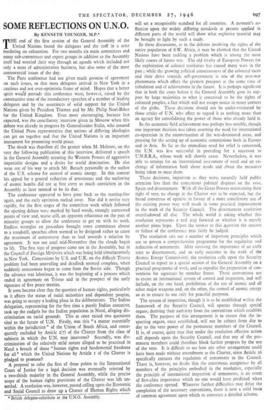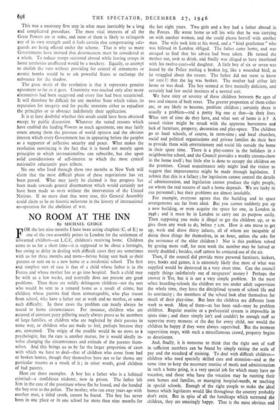SOME REFLECTIONS ON U.N.O.
By KENNETH YOUNGER, M.P.•
THE end of the first session of the General Assembly of the United Nations found the delegates and the staff in a state bordering on exhaustion. For two months six main committees and many sub-committees and expert groups in addition to the Assembly itself had worried their way through an agenda which included not only a mass of administrative business, but also some of the most controversial issues of the day.
The Paris conference had not given much promise of agreement on such issues, so that most delegates arrived in New York in a cautious and not over-optimistic frame of mind. Hopes that a better spirit woad pervade this conference were, however, raised by the constructive tone of the introductory speeches of a number of leading delegates and by the assurances of solid support for the United Nations given by President Truman and by Mr. Philip Noel-Baker for the United Kingdom. Even more encouraging, because less expected, was the conciliatory interview given in Moscow when this debate was already in progress by Generalissimo Stalin, who assured the United Press representative that nations of differing ideologies can get on together and that the United Nations is an important instrument for promoting world peace.
The shock was therefore all the greater when M. Molotov, on the very day following publication of this interview, delivered a speech in the General Assembly accusing the Western Powers of aggressive imperialist designs and a desire for world domination. He also went out of his way to attack Mr. Baruch personally as the author of the U.S. scheme for control of atomic energy. In this context his appeal for a general reduction of armaments and the outlawing of atomic bombs did not at first carry as much conviction in the Assembly as later seemed to be its due.
The conference appeared to have gone back to the starting-line again, and the early optimism melted away. Nor did it revive very rapidly, for the first stages of the committee work which followed the opening debate were marked by hard words, strongly contrasted points of view and, worse still, an apparent reluctance on the part of minority groups to allow the conference to get on with its work. Endless wrangles on procedure brought some committees almost to a standstill, speeches often seemed to be designed rather to cause the maximum of controversy than to lead towards a solution by agreement. It was not until mid-November that the clouds began to lift. The first sign of progress came not in the Assembly, but in the Council of Foreign Ministers which was being held simultaneously in New York. Concessions by U.S. and U.K. on the difficult Trieste problem had been unavailing and deadlock seemed complete, when suddenly concessions began to come from the Soviet side. Though the advance was laborious, it was the beginning of a process which ended in agreement on Trieste and in the prospect of the early signature of five peace treaties.
It soon became clear that the question of human rights, particularly as it affects the status of racial minorities and dependent peoples, was going to occupy a leading place in the deliberations. The Indian delegation, representing for the first time a purely Indian executive, took up the cudgels for the Indian population in Natal, alleging dis- crimination on racial grounds. This at once raised two questions vital to the future of U.N. Firstly, was this " a matter essentially within the jurisdiction " of the Union of South Africa, and conse- quently excluded by Article 2(7) of the Charter from the class of subjects in which the U.N. may intervene? Secondly, was dis- crimination of the relatively mild nature alleged to be practised in Natal a breach of those " human rights and fundamental freedoms for all" which the United Nations by Article r of the Charter is pledged to promote? A proposal to refer the first of these points to the International Court of Justice for a legal decision was eventually rejected by a two-thirds majority in the General Assembly, while the precise scope of the human rights provisions of the Charter was left un- settled. A resolution was, however, passed calling upon the Economic and Social Council to draw up a Charter of Human Rights which *British delegate-substitute at the U.N.O. Assembly. will set a recognisable standard for all countries. A moment's re- flection upon the widely differing standards at present applied in different parts of the world will show what explosive material may be brought to light by such a study.
In these discussions, as in the debates involving the rights of the native population of S.W. Africa, it may be claimed that the United Nations have been tackling a problem which is among the most likely causes of future war. The old rivalry of European Powers for the exploitation of colonial territories has caused many wars in the past ; while the growing political consciousness of the coloured races and their drive towards self-government is one of the post-war phenomena which offers the greatest prospect at the same time of tribulation and of achievement in the future. It is perhaps significant that in both the cases before it the General Assembly gave its sup- port by large majorities to what it conceived to be the rights of coloured peoples, a fact which will not escape notice in many corners of the globe. These decisions should not be under-estimated by those critics of U.N. who affect to regard it as nothing more than an agency for consolidating the power of those who already hold it.
In the economic field achievement was perhaps less notable, though one important decision was taken asserting the need for international co-operation in the reconstruction of the war-devastated areas, and pressing for the setting up of economic commissions both in Europe and in Asia. So far as the immediate need for relief is concerned, the U.N. was less successful in providing for a successor to U.N.R.R.A., whose work will shortly cease. Nevertheless, it was able to arrange for an international assessment of need and an ex- change of information both about needs and about the measures being taken to meet them.
These decisions, important as they were, naturally held public attention less than the contentious political disputes on the veto, Spain and disarmament. With all the Great Powers maintaining their right of veto, no change in the Charter was to be expected, but the broad consensus of opinion in favour of a more conciliatory use of the existing power may well result in some practical improvement in the work of the Security Council. The disarmament resolution overshadowed all else. The whole world is asking whether this resolution represents a real step forward or whether it is merely another pious hope. Upon the answer to this question the success or failure of the conference may fairly be judged.
The resolution sets out a number of important principles which are to govern a comprehensive programme for the regulation and reduction of armaments. After stressing the importance of an early start to disarmament, and an early outcome to the work of the Atomic Energy Commission", the resolution calls upon the Security Council to report to a special session of the General Assembly on a practical programme of work, and to expedite the preparation of con- ventions for signature by member States. These conventions are to create an international system of control and inspection, and will include, on the one hand, prohibition of the use of atomic and all other major weapons and, on the other, the control of atomic energy so as to ensure its use only for peaceful purposes.
The system of inspection, though it is to be established within the framework of the Security Council, will operate through special organs, deriving their authority from the conventions which establish them. The purpose of this arrangement is to ensure that the in- specting organs, once established, will not be subject from day to day to the veto power of the permanent members of the Council. It is, of course, quite true that under the resolution effective action still depends upon the Security Council, and that any of the per- manent members could therefore block further progress by the use of the veto. It is difficult to see how any other arrangement could have been made without amendment to the Charter, since Article 26 specifically entrusts the regulation of armaments to the Council. There is, however, no doubt that the unanimous acceptance by all members of the principles embodied in the resolution, especially the principle of international inspection of armaments, is an event of first-class importance which no one would have predicted when the conference opened. Whatever further difficulties may delay the completion of the necessary conventions, there is now a solid basis of common agreement upon which to construct a detailed scheme.
This was a necessary first step in what must inevitably be a long and complicated procedure. The most vital interests of all the Great Powers are at stake, and none of them is likely to relinquish any of its own strength until it feels certain that compensating safe- guards are being offered under the scheme. That is why so many Governments have insisted that disarmament must be considered as a whole. To reduce troops stationed abroad while leaving troops in home territories unaffected would be a mockery. Equally, to attempt to abolish the veto without providing for control of armaments or atomic bombs would be to ask powerful States to exchange the substance for the shadow.
The great merit of the resolution is that it represents genuine agreement so far as it goes. Unanimity was reached only after many alternatives had been suggested and every line had been scrutinised. It will therefore be difficult for any member State which values its reputation for integrity and for pacific intention either to repudiate the principles or to obstruct indefinitely their application.
It is at least doubtful whether this result could have been obtained except by public discussion. Whatever the varied reasons which have enabled the leading Powers to reach agreement, one may fairly count among them the pressure of world opinion and the obvious interest which every Government has in appearing before the peoples as a supporter of collective security and peace. What makes the resolution convincing is the fact that it is based not merely upon principles to which internationalists can subscribe, but also upon solid considerations of self-interest to which the most cynical nationalist reluctantly pays tribute.
No one who lived through these two months at New York will claim that the most difficult phase of these negotiations has yet been passed. What may justly be claimed is that progress has been made towards general disarmament which would certainly not have been made so soon without the intervention of the United Nations. If no more than that were true, this General Assembly could claim to be an historic milestone in the history of international co-operation for the abolition of war.































 Previous page
Previous page